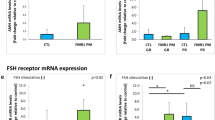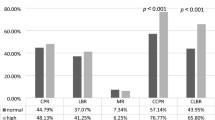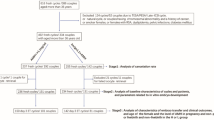Abstract
The present prospective cohort study evaluated the prevalence of FSH-R receptor Asn680Ser and Ala307Thr among infertile Indian women and the correlation of these polymorphisms with ART outcomes. Total 804 infertile and 209 fertile controls were enrolled for FSH-R analysis. Correlation of different genotypes with ovarian reserve markers, IVF parameters, and cumulative live birth rates (CLBR) was done among women undergoing IVF. In fertile controls, at 680 position GG (Ser/Ser) was the most common genotype; but among infertile women, all the genotypes were equally distributed. There was no significant difference in ovarian response parameters, oocyte yield, and CLBR among the three genotype groups. Empty follicle syndrome (EFS) was highest in women with AA or AG type at both positions. On categorisation of unexpected poor responders according to POSEIDON stratification; GG genotype at both positions had the lowest risk ratio of low-oocyte yield in ART cycles, but these differences were not statistically significant. This is the largest study from Indian ethnicity showing GG (Ser/Ser) genotype is most common among fertile women. The effect of FSH-R genotypes is very marginal on IVF parameters and is not reflected in CLBR. More prospective data may be required on the correlation of these genotypes with genuine EFS, thus stratifying the next cycles with self or donor oocytes. Routine genetic testing of FSH-R polymorphism should not be done except in a research setting. As both 680 and 307 positions are in linkage disequilibrium, only 680 position analysis may be done in a research setting.
This is a preview of subscription content, access via your institution
Access options
Subscribe to this journal
Receive 12 print issues and online access
$259.00 per year
only $21.58 per issue
Buy this article
- Purchase on Springer Link
- Instant access to full article PDF
Prices may be subject to local taxes which are calculated during checkout



Similar content being viewed by others
References
Sunkara SK, Rittenberg V, Raine-Fenning N, Bhattacharya S, Zamora J, Coomarasamy A. Association between the number of eggs and live birth in IVF treatment: an analysis of 400 135 treatment cycles. Hum Reprod. 2011;26:1768–74.
Altmäe S, Hovatta O, Stavreus-Evers A, Salumets A. Genetic predictors of controlled ovarian hyperstimulation: where do we stand today? Hum Reprod Update. 2011;17:813–28.
Casarini L, Simoni M. Gene polymorphisms in female reproduction. Methods Mol Biol. 2014;1154:75–90.
Dieamant F, Petersen CG, Vagnini LD, Petersen B, Ricci J, Nicoletti A, et al. The Ala307Thr polymorphism of the follicle-stimulating hormone receptor (FSHR) gene is associated with the dose of recombinant FSH received during IVF/ICSI treatment. JBRA Assist Reprod. 2023;27:78–84.
Perez Mayorga M, Gromoll J, Behre HM, Gassner C, Nieschlag E, Simoni M. Ovarian response to follicle-stimulating hormone (FSH) stimulation depends on the FSH receptor genotype. J Clin Endocrinol Metab. 2000;85:3365–9.
Alviggi C, Conforti A, Santi D, Esteves SC, Andersen CY, Humaidan P, et al. Clinical relevance of genetic variants of gonadotrophins and their receptors in controlled. ovarian stimulation: a systematic review and meta-analysis. Hum Reprod Update. 2018b;24:1–16.
Nenonen HA, Lindgren IA, Prahl AS, Trzybulska D, Kharraziha I, Hultén M. The N680S variant in the follicle-stimulating hormone receptor gene identifies hyperresponders to controlled ovarian stimulation. Pharmacogenet Genomics 2019;29:114–20.
Achrekar SK, Modi DN, Desai SK, Mangoli VS, Mangoli RV, Mahale SD. Follicle-stimulating hormone receptor polymorphism (Thr307Ala) is associated with variable ovarian response and ovarian hyperstimulation syndrome in Indian women. Fertil Steril. 2009;91:432–9.
Plozos NP, Neves AR, Drakopoulos P, Spits C, Mercadal BA, Gracia S, et al. The effect of polymorphisms in FSHR and FSHB genes on ovarian response: a prospective multicenter multinational study in Europe and Asia. Hum Reprod. 2021;36:1711–21.
Simoni M, Casarini L. Mechanisms in endocrinology: genetics of FSH action a 2014-and-beyond view. Eur J Endocrinol. 2014;170:R91–107.
La Marca A, Sighinolfi G, Argento C, Grisendi V, Casarini L, Volpe A, et al. Polymorphisms in gonadotropin and gonadotropin receptor genes as markers of ovarian reserve and response in. in vitro fertilization. Fertil Steril. 2013;99:970–8.e1.
Trevisan CM, Peluso C, Cordts EB, R De O, Christofolini DM, Barbosa CP, et al. Ala307Thr and Asn680Ser polymorphisms of FSHR gene in human reproduction outcomes. Cell Physiol Biochem. 2014;34:1527–35.
König TE, J van der L, Schats R, Lambalk CB. The relationship between FSH receptor polymorphism status and IVF cycle outcome: a retro- spective observational study. Reprod Biomed Online. 2019;39:231–40.
Lin YC, Chang SY, Lan KC, Huang HW, Chang CY, Tsai MY, et al. Human oocyte maturity in vivo determines the outcome of blastocyst development in vitro. J Assist Reprod Genet. 2003;20:506–12.
Kuijper EAM, Blankenstein MA, Luttikhof LJ, Roek SJM, Overbeek A, Hompes PG, et al. Frequency distribution of polymorphisms in the FSH receptor gene in infertility patients of different ethnicity. Reprod Biomed Online. 2011;22:S60–65.
Conforti A, Tüttelmann F, Alviggi C, Behre HM, Fischer R, Hu L, et al. Effect of genetic variants of gonadotropins and their receptors on ovarian stimulation outcomes: a delphi consensus. Front Endocrinol (Lausanne). 2022;12:797365.
Yan Y, Gong Z, Zhang L, Li Y, Li X, Zhu L, et al. Association of follicle-stimulating hormone receptor polymorphisms with ovarian response in Chinese women: a prospective clinical study. PloS One. 2013;8:e78138.
Huang X, Li L, Hong L, Zhou W, Shi H, Zhang H, et al. The Ser680Asn polymorphism in the follicle-stimulating hormone receptor gene is associated with the ovarian response in controlled ovarian hyperstimulation. Clin Endocrinol. 2015;82:577–83.
Desai SS, Achrekar SK, Paranjape SR, Desai SK, Mangoli VS, Mahale SD. Association of allelic combinations of FSHR gene polymorphisms with ovarian response. Reprod Biomed Online. 2013;27:400–6.
Baldini MG, Catino A, Palini S, Sciorio R, Ferri D, Vinciguerra M, et al. The polymorphism Asn680Ser on the FSH receptor and abnormal ovarian response in patients with normal values of AMH and AFC. Int J Mol Sci 2023;24:1080.
Bayraktar B, Güleç ES, Kutbay YB, Köse C, Gür EB, Demir A. Does follicle-stimulating hormone receptor polymorphism status affect In vitro fertilization-intracytoplasmic sperm injection results and live birth rate? A retrospective study. J Hum Reprod Sci. 2022;15:58–63.
Klinkert ER, te Velde ER, Weima S, van Zandvoort PM. Hanssen RGJM, Nilsson PR, et al. FSH receptor genotype is associated with pregnancy but not with ovarian response in IVF. Reprod Biomed Online. 2006;13:687–95.
Revelli A, Carosso A, Grassi G, Gennarelli G. Stefano Canosa 2, Benedetto C. Empty follicle syndrome revisited: definition, incidence, aetiology, early diagnosis and treatment. Reprod Biomed Online. 2017;35:132–8.
Jun JK, Yoon JS, Ku S-Y, Choi YM, Hwang KR, Park SY, et al. Follicle-stimulating hormone receptor gene polymorphism and ovarian responses to controlled ovarian hyperstimulation for IVF-ET. J Hum Genet. 2006;51:665–70.
Lindgren I, Nenonen H, Henic E, Bungum L, Prahl A, Bungum M, et al. Gonadotropin receptor variants are linked to cumulative live birth rate after in vitro fertilization. J Assist Reprod Genet. 2019;36:29–38.
Funding
The study was done with funding from Science and Engineering Research Board (SERB), as an extramural funding.
Author information
Authors and Affiliations
Corresponding author
Ethics declarations
Ethical approval
The study was done after ethical approval from the Institute Ethics Committee (IEC).
Competing interests
The authors declare no competing interests.
Additional information
Publisher’s note Springer Nature remains neutral with regard to jurisdictional claims in published maps and institutional affiliations.
Supplementary information
Rights and permissions
Springer Nature or its licensor (e.g. a society or other partner) holds exclusive rights to this article under a publishing agreement with the author(s) or other rightsholder(s); author self-archiving of the accepted manuscript version of this article is solely governed by the terms of such publishing agreement and applicable law.
About this article
Cite this article
Mahey, R., Rajput, M., Dada, R. et al. Prevalence of FSH-R Asn680Ser and Ala307Thr receptor polymorphism and their correlation with ART outcomes among infertile Indian-Asian women-a prospective cohort study. J Hum Genet (2024). https://doi.org/10.1038/s10038-024-01251-8
Received:
Revised:
Accepted:
Published:
DOI: https://doi.org/10.1038/s10038-024-01251-8



